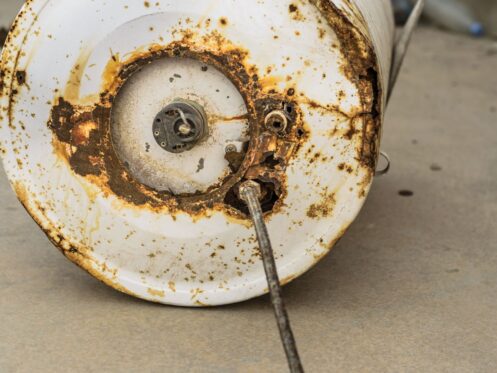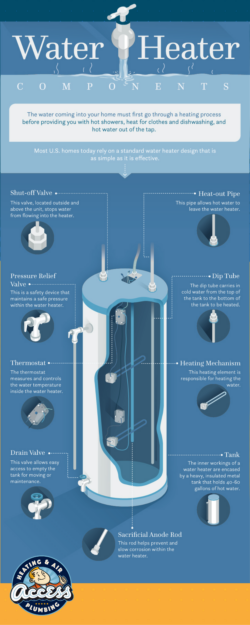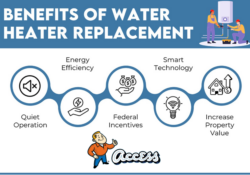Seeing rust on your water heater can send a shiver down your spine. That reddish-brown discoloration, whether in your hot water or on the unit itself, often triggers one immediate thought: “Oh no, my water heater is dying! Is it time for an expensive replacement?”
It’s a valid concern. After all, a water heater is a big investment and a vital appliance for your Boise home. The common belief is that any sign of rust means your unit is toast. But is that always the case?
Not necessarily. While some rust does signal the end of your water heater’s life, other types might indicate a less severe issue that can be repaired. Knowing the difference can save you a lot of worry and potentially, a lot of money.
Here at Access Heating, Air & Plumbing, we’ve helped countless Boise homeowners navigate water heater dilemmas. We understand the worry that rust can cause. Let’s dive deeper into what rust on your water heater really means, and when you truly need to call for a replacement.
The Ever-Present Battle: Water, Metal, and Rust
Think about your water heater. It’s essentially a large metal tank constantly holding hot water. This direct contact between metal and water creates a natural risk: corrosion. Rust, or iron oxide, forms when iron (like the steel in your tank) meets both oxygen and water. It’s a chemical reaction that slowly eats away at the metal.
Given this constant exposure, you might wonder why water heaters don’t rust out in a few years. The truth is, modern water heaters are built with clever features designed to fight this very battle and protect the tank for a long time.
How Your Water Heater Fights Back Against Rust
Before we look at the problematic rust spots, let’s appreciate the built-in defenses that keep your water heater healthy:
Glass-Lined Tank: Inside your water heater, the steel tank isn’t directly exposed to water. It’s coated with a thin layer of glass-like porcelain. This “vitreous enamel” acts as a strong shield, preventing water from touching the steel. It’s the first and most crucial defense. However, over time, changes in temperature and mineral buildup can cause tiny cracks in this lining, creating weak spots.
Airtight Design: Your water heater tank is sealed. While not perfectly airtight, this design limits how much fresh oxygen can get inside, especially when the tank is full. Less oxygen means less opportunity for rust to form.
Dielectric Unions: Have you ever noticed different types of metal piping connected to your water heater? When dissimilar metals touch (like copper pipes connected to a steel tank), it can speed up corrosion. Special fittings called “dielectric unions” are used to electrically isolate these metals. This prevents a special type of accelerated rust called galvanic corrosion.
The Sacrificial Anode Rod: Your Water Heater’s Secret Weapon This is by far the most important rust-prevention feature. Hidden inside your tank, usually screwed into the top, is a long, thin rod. It’s typically made of magnesium or aluminum.
How does it work? It’s quite brilliant: the anode rod is designed to rust instead of your steel water heater tank. It literally “sacrifices” itself. When water is in the tank, it acts like a conductor, allowing a tiny electric current to flow. The more reactive metal of the anode rod attracts the corrosive elements in the water, pulling them away from the tank’s steel walls. Think of it as a magnet for rust-causing particles. This continuous process slowly wears away the anode rod. Eventually, it will be completely consumed. Once it’s gone, your water heater tank loses its primary defense, making it very vulnerable to internal rusting. This is why regular water heater maintenance, is so vital. A professional technician will check the anode rod during a tune-up. If it’s heavily corroded, they’ll replace it. This simple, affordable step can significantly extend the life of your entire water heater. Neglecting it is one of the biggest reasons tanks fail early.
Where is the Rust? Location is Everything!
When you spot rust, its location tells a very important story. This helps determine if you need a quick fix or a new water heater.
1. Rust in Your Hot Water
This is often the most alarming sign. You turn on the faucet, and out comes rusty-looking hot water. Naturally, you’ll think your water heater is rusting inside. This is definitely a possibility, but there are other reasons too.
Possibility A: Sediment Buildup (Less Serious) Boise water, like many areas, has minerals like calcium and magnesium. Over time, these minerals settle at the bottom of your water heater tank as sediment. This sediment can look reddish-brown. If the sediment gets stirred up (for example, when you forcefully turn on a tap), it can mix with the water, making it appear rusty. This isn’t rust from the tank itself.
Solution: A professional water heater flush can often fix this. Our technicians drain the tank and use water pressure to remove the accumulated sediment. Regular flushing (ideally once a year) is a key part of water heater maintenance that prevents this and also improves your unit’s efficiency.
How to tell: The rusty water might be intermittent. It might appear after the water heater has been sitting unused for a while, or after you’ve used a lot of hot water. The water often clears up after running for a few minutes.
Possibility B: Internal Tank Rust (Serious – Likely Needs Replacement) This is the more serious scenario. If the glass lining inside your tank has large cracks, and your sacrificial anode rod has completely worn away, the steel walls of the tank will begin to rust. When this happens, rust particles mix directly with your hot water.
Solution: Unfortunately, an internally rusted water heater tank means its structure is compromised. There’s no safe or effective way to repair internal tank rust. This almost always means you need a water heater replacement.
How to tell: The rusty discoloration is persistent. It appears every time you use hot water and doesn’t clear up after running the tap for a few minutes. You might also notice a metallic smell or taste in the hot water.
Possibility C: Rust from Your Pipes (Could Be Misleading) Sometimes, rusty water comes from old galvanized iron pipes in your home, which are corroding from the inside. This can be confusing because it looks like a water heater problem.
How to check: Run cold water from a tap that doesn’t come from the water heater (like an outdoor spigot). If the cold water is also rusty, the problem is likely with your pipes, not just the water heater. If only the hot water is rusty, your water heater is the more likely source.
2. Rust Around the Heat Exchanger (Gas Water Heaters Only)
If you have a gas water heater, you might see rust near the bottom, around the burner or combustion chamber. This rust could be on the heat exchanger.
What it is: The heat exchanger is a crucial part that transfers heat from the gas flame to the water in the tank. It’s usually made of steel or cast iron.
Why it rusts: Condensation can form on the heat exchanger’s cooler metal surface when hot combustion gases come into contact with it. This condensation, mixed with exhaust byproducts, can create a corrosive environment that leads to rust.
Severity: This is a serious issue that needs immediate professional attention. A rusted heat exchanger can crack, potentially leaking dangerous carbon monoxide gas into your home. Carbon monoxide is odorless and colorless, making it incredibly dangerous.
Solution: A trained technician might be able to replace a rusted heat exchanger. However, this is a complex repair. Its cost-effectiveness depends on the age and overall condition of your water heater. Sometimes, replacing the whole unit is the better long-term choice.
Don’t Wait: If you see rust in this area, or notice a strong sulfur smell (like rotten eggs), or if your gas water heater’s pilot light frequently goes out, turn off your water heater immediately and call for water heater repair in Boise, ID. Safety is paramount.
3. Rust on the Top of the Tank
Spotting rust on the very top of your water heater, especially near where the pipes connect, usually points to a different problem than tank corrosion.
- Possible Cause: This rust often comes from a slow, steady leak. It could be from the hot or cold water inlet/outlet pipes, or from the temperature and pressure (T&P) relief valve. Water drips onto the top metal jacket of the tank, causing external rust.
- Severity: This is generally less severe than internal tank rust. However, a continuous leak can lead to water damage in your utility room or basement. If ignored, the rust can spread and potentially compromise the outer casing of the unit.
- Solution: A qualified plumber or water heater repair technician can quickly find and fix the leak. This might involve tightening a loose connection, replacing a worn-out pipe fitting, or installing a new T&P relief valve. Once the leak is stopped, they’ll check the rust. If it’s just surface rust, they might be able to clean it. If it’s heavily corroded the outer metal, they might recommend replacing the entire unit for safety and durability.
4. Rust Along the Side or Bottom of the Main Tank Body (Exterior)
This is perhaps the most straightforward sign of trouble – and often the most serious. If you see rust spots or streaks directly on the exterior metal jacket of your water heater tank, especially near the bottom or sides, it’s usually a clear warning sign.
- Possible Cause A: Internal Tank Leak (Extremely Serious – Requires Replacement) This is the most common and concerning reason for external tank rust. It means the inner steel tank has sprung a leak. The water has seeped through the inner glass lining, through the insulation, and finally reached the outer metal jacket. Once the inner tank starts leaking, it’s a critical failure of the tank’s structure.
- Severity: This is a major red flag. An inner tank leak cannot be repaired. It will only worsen over time, leading to potentially significant water damage in your home.
- Solution: Immediate water heater replacement is essential.
- How to tell: Besides the visible rust, you might notice small puddles of water around the base of the water heater (even if tiny at first). There might be a musty smell, or your water heater might struggle to produce enough hot water.
- Possible Cause B: External Leak from Another Source (Less Common, but Possible) Occasionally, water from an overhead pipe, a leaky washing machine hose, or even a foundation issue can drip onto the water heater’s exterior, causing rust.
- How to check: Carefully inspect the area above and around your water heater for other signs of water. If you can definitively prove the water is coming from another source and simply dripping onto the water heater, then fixing that external leak will solve the rust problem. However, for widespread external tank rust, this scenario is less common.
Beyond Rust: When to Consider a Water Heater Replacement Anyway
While rust is a major indicator, it’s important to look at the bigger picture of your water heater’s health. Sometimes, even if the rust isn’t catastrophic, other factors point towards replacement.
- Age of Your Unit: Most conventional tank water heaters last between 10-15 years. If your unit is approaching or has already passed this age mark, and you’re seeing any signs of rust or other issues, investing in a replacement often makes more financial sense than pouring money into repairs. Older units are also far less energy-efficient than new models.
- Frequent Repairs: Are you calling for water heater repair in Boise, ID, every few months? If you’re constantly fixing small issues, the cumulative cost of these repairs can quickly add up. At some point, it becomes more economical to invest in a brand-new, reliable unit.
- Soaring Energy Bills: As water heaters age, they often become less efficient. Sediment buildup, worn-out parts, and a depleted anode rod can all force your unit to work harder, consuming more energy and leading to higher utility bills. A new, energy-efficient model (including tankless options) can offer significant long-term savings.
- Not Enough Hot Water: If your water heater isn’t producing enough hot water, or if it runs out quickly, it could be due to internal problems like excessive sediment, a failing heating element (for electric units), or a faulty burner (for gas units). While some of these can be repaired, if your unit is also old, it’s often a sign that replacement is the better choice.
Your Best Bet? A Professional Assessment
It’s natural to try and figure out water heater problems yourself. But when it comes to rust, leaks, and potential safety hazards like carbon monoxide, calling a qualified professional is always the smartest move. Here’s why:
- Accurate Diagnosis: Our experienced Boise water heater technicians have the specialized tools and training to correctly diagnose the source of rust or a leak. They can tell the difference between harmless sediment and dangerous internal tank corrosion. They can also spot subtle leaks and assess the condition of crucial parts like the anode rod and heat exchanger.
- Safety First: Working with gas lines, electrical components, and hot water can be extremely dangerous if you don’t have the proper training. Our professionals are trained to work safely and effectively. Carbon monoxide leaks, in particular, are a silent killer and demand immediate expert attention.
- Proper Repair or Replacement: If a repair is feasible, our technicians will ensure it’s done correctly, using the right parts and techniques. If a replacement is necessary, they’ll guide you through the process, helping you choose the perfect size and type of water heater for your home’s unique needs and budget. We handle everything from expert water heater installation in Boise to safely removing and disposing of your old unit.
- Protect Your Warranty: Attempting DIY repairs on your water heater can often void its manufacturer’s warranty. Professional service ensures your warranty remains valid.
Don’t Let Rust Leave You in the Cold!
Finding rust on your water heater can be unsettling, but it doesn’t always mean disaster. By understanding the different types of rust and what they signal, you can approach the situation with confidence.
At Access Heating, Air & Plumbing, we are dedicated to providing honest, reliable water heater service in Boise, ID, and surrounding communities. Whether you need a simple water heater repair, a proactive water heater maintenance check to prevent future rust, or a complete water heater replacement, our team is here to ensure your home has a consistent, safe, and efficient supply of hot water.
Don’t wait for a small rust spot to turn into a major problem. If you see any signs of corrosion on or around your water heater, pick up the phone and call Access Heating, Air & Plumbing today. We’ll provide a thorough inspection, explain your options clearly, and help you make the best decision for your home and your peace of mind.
Ready to get started? Schedule your water heater inspection or service today and let us help you keep the hot water flowing!



